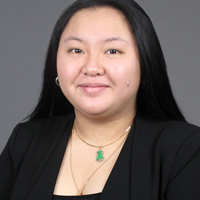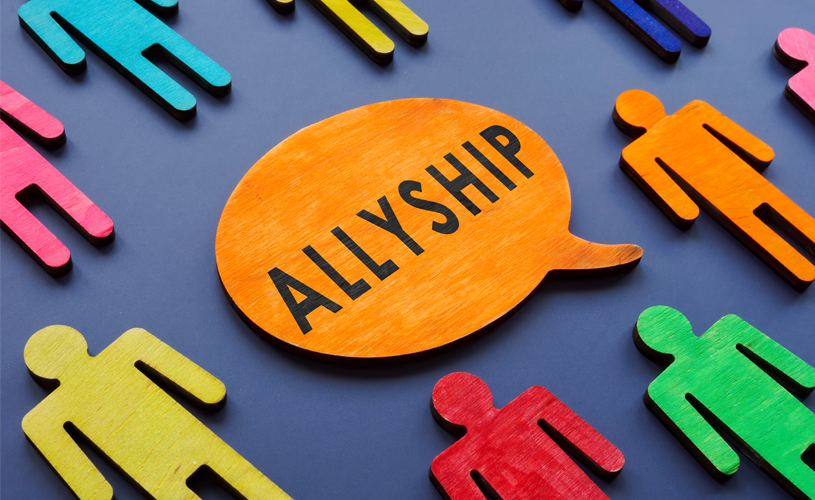at the University of Utah
Amplifying Marginalized Voices: Steps Toward Allyship
Allyship is a term that sprung up within the last decade, a popular discussion topic within social justice spaces over the last couple of years. The definition of allyship is the act of a person of privilege standing in solidarity with marginalized communities to support ongoing efforts against systems of oppression.
Allyship has a large role in creating an equitable environment and community. It is the glue that can mold and hold an inclusive future. In a previous blog post, Amplifying Marginalized Voices: Why It Matters, I spoke on the responsibilities of privileged identities and their role in the continuous fight for human rights:
“More broadly, individuals with relatively more privileged identities have a responsibility to utilize their advantages to advocate for those who have relatively more marginalized identities. This commitment on the part of more privileged members of our communities is imperative to empowering marginalized voices and uplifting the current environment of both the workplace and education.”
Those who have aspects of privilege also need to utilize their platform and advocate for those less fortunate. There are many steps you can take to becoming a better ally, and here are some for you to read about:
Recognize Your Privilege
According to Oxford Languages, the definition of “Privilege” is a special right, advantage, or immunity granted or available only to a particular person or group.”
It is important to first recognize the privileges you hold within your own identity and own life. Oftentimes, it is difficult for individuals to identify their privilege. There are many areas where marginalized voices are not empowered, take it upon yourself to take a step back and provide the spotlight to individuals who typically do not get the opportunity to share their voices.
There are multiple non-performative ways to take action, such as educating others, speaking out on injustices in your own circles, understanding marginalized experiences, and being actively anti-racist.
Listen
Stop and listen. To best advocate and support marginalized voices, listen to the stories, experiences, and challenges facing BIPOC (black, indigenous, people of color) lives. Attend local speaker events or activities aimed at promoting discussions on this subject. Many Eccles affinity student groups, such as the AAPI Students in Business or Out for Business, host many events on the subject of inclusivity and marginalized experiences. Make sure you attend all the possible experiences available around you.
There are many other ways to listen to the stories being told, such as podcasts, films, or books. The whole world is filled with stories, it is now your time to sit down and listen to them. Consider checking out one of these 7 great podcasts focusing on race, diversity, and equity in the workplace. The key to being a good ally is to listen and learn.
Educate Yourself / Get Informed
Education is the number one opponent against ignorance. It is important to get deep into the history and information that affects marginalized communities. However, rather than going to your BIPOC friends and colleagues, try to learn for yourself. It is not their responsibility to educate you on concepts of social justice and inclusion. Instead, take it upon yourself to do your own research and actively learn about the history, effects, and experiences of the specific topic you want to ally with.
If reading isn’t your cup of tea, then switch to educational films and shows, or listen to audiobooks. The University of Utah J. Willard Marriott library has an endless amount of EDI (equity, diversity, and inclusion) material and resources, both modern and historic, to guide you during your educational and informative journey. Other platforms like Netflix and YouTube also highlight many social justice films; the world is your oyster!
Talk About Tough Stuff
It can be hard to talk about intense or tough subjects, especially regarding systemic and racial injustices. However, in a world where microaggressions, racism, discrimination, and racial bias has become normalized within our society and institutions, we need to start having tough talks. We need to start getting comfortable with the uncomfortable. Embrace that discomfort and those tough talks.
Authentic allyship includes standing up against areas of discrimination and speaking up. In all realism, it can be difficult to confront oppression. However, staying complicit will contribute to these prejudicial systems against BIPOC communities. Be attentive to the behaviors happening within your classes, workplace, and social spaces. Oppression comes in many forms, and we must recognize these challenges to have these tough talks, to further advance our cultural competency and awareness.
Endless Ways to Support
There is an endless list of ways you can be an ally, such as educating others, donating to equitable causes, or signing petitions, but the main objective is to amplify marginalized voices and stories. Provide the spotlight on these stories and spread these voices. It is essential to highlight BIPOC experiences, but it is equally important to not centralize yourself within the conversation. Although it can be tough to be in a racist and systemically oppressive society, the biggest and most essential role of an ally is to support.
Notably, If you’re an ally only behind a closed door, then you’re not a true ally.

Victoria Nguyen is a Marketing and Business Administration student at the Eccles School of Business. She currently serves as Student Coordinator for the Student Engagement & Assessment department and as an intern for the Eccles Marketing + Communications team.





